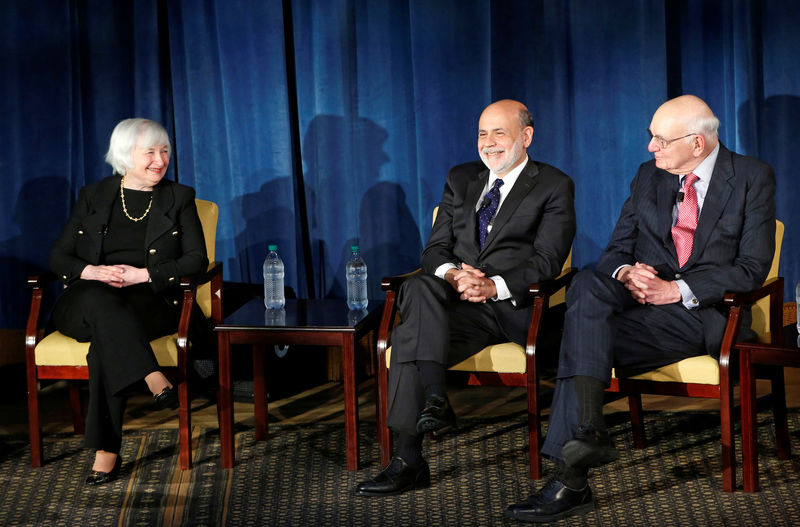WASHINGTON (Reuters) - The four living former chairs of the Federal Reserve on Monday called for the U.S. central bank to remain free to work independently and without fear of political reprisals in a rare joint public statement.
President Donald Trump has repeatedly railed against the Fed for raising rates four times last year, saying that Chairman Jerome Powell's monetary policies have held back economic growth. Trump has publicly said he could fire or demote Powell, his own nominee as chair.
The public pressure on the Fed by a U.S. president has been unprecedented, as the institution has traditionally been viewed as independent.
"As former chairs of the board of governors of the Federal Reserve System, we are united in the conviction that the Fed and its chair must be permitted to act independently and in the best interests of the economy, free of short-term political pressures and, in particular, without the threat of removal or demotion of Fed leaders for political reasons," the four former Fed chairs - Paul Volcker, Alan Greenspan, Ben Bernanke and Janet Yellen -wrote in an opinion essay published in the Wall Street Journal.
"It is critical to preserve the Federal Reserve's ability to make decisions based on the best interests of the nation, not the interests of a small group of politicians," the former Fed chairs wrote.
Volcker was first appointed by Democratic President Jimmy Carter and reappointed to a second term by Republican President Ronald Reagan. Greenspan was appointed by four different presidents -- Reagan, Republicans George H.W. Bush and George W. Bush, and Democrat Bill Clinton. Bernanke was appointed by George W. Bush and reappointed by Democratic President Barack Obama. Yellen was appointed by Obama.
The U.S. central bank lowered interest rates to historically low rates and accumulated bonds on its ledger in a bid to stimulate growth after the 2008 financial crisis.
But amid a lengthy economic recovery, the Fed has raised borrowing costs and winnowed bond holdings, measures that Trump has criticized.
On Wednesday, the Fed cut interest rates for the first time in a decade and moved up plans to stop shedding its bond holdings. In explaining the cut, Powell cited signs of a global slowdown, U.S. trade tensions and an effort to raise inflation.
On Monday, as trade tensions with China heated up, Trump referred to the Fed yet again in response to Beijing's move to devalue its currency.
"China dropped the price of their currency to an almost a historic low. It's called 'currency manipulation.' Are you listening Federal Reserve?" Trump tweeted.

White House economic adviser Larry Kudlow said last month that the president had ruled out taking currency intervention measures, though in comments to reporters, Trump has been less clear.